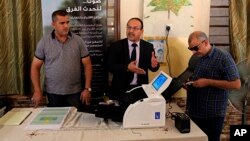Iraq plans to use a new electronic system in next month's national elections that will limit fraud and allow for the announcement of results within hours of polls closing, the election commission said Monday.
The Independent High Electoral Commission said that 60,000 devices will be distributed nationwide to send voting data via satellite. Employees have tested the system and found it to be as reliable as hand-counting, the commission said.
In previous elections, voters filled out ballots and then dipped their fingers in purple ink, a measure that was designed to prevent repeat voting. Images of jubilant voters raising purple fingers came to symbolize hope for a democratic future after the U.S.-led invasion toppled Saddam Hussein in 2003.
But the voting process itself was cumbersome. Ballots had to be collected and then transported to Baghdad to be counted by hand. It would be weeks before results were known, though partial results were sometimes released following pressure from political parties.
In the upcoming elections, voters will insert electoral cards into a machine before marking the ballots with an electronic pen. Afterward, the ballots will be put into a scanner to tally and record the results.
"This new process will ensure both a quick and free-of-fraud election process,'' said Aziz al-Kheikani, a spokesman for the electoral commission.
Some 2.3 million people are still uprooted from their homes following the three-year military campaign against the Islamic State group, which devastated entire towns and neighborhoods in northern and western Iraq. Political parties and aid groups have expressed concerns that most would not be able to update their information with authorities and would therefore be ineligible to vote.
IHEC member Karim al-Tamimi said those who don't have the new card will be able to vote with the one from previous elections. He said those who have no cards at all can vote after submitting other forms of identification.
Nearly 7,000 candidates will vie for 329 seats in the May 12 parliament elections, the fourth since the 2003 U.S.-led invasion.





